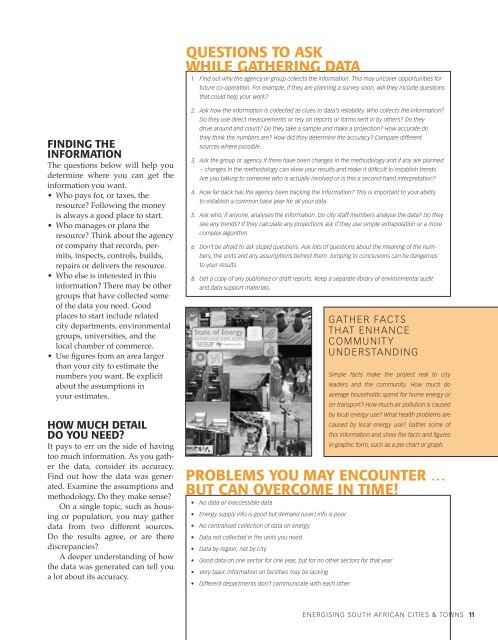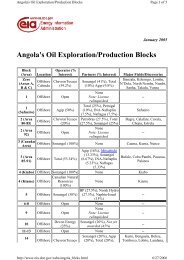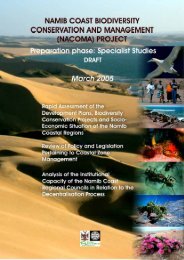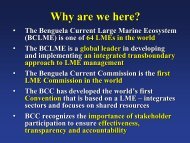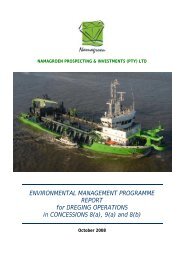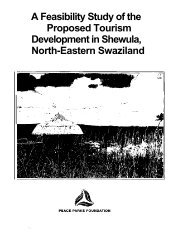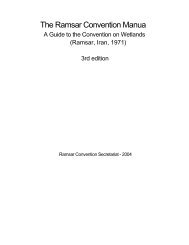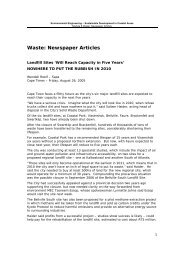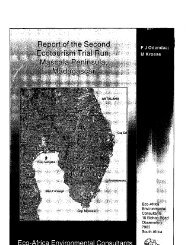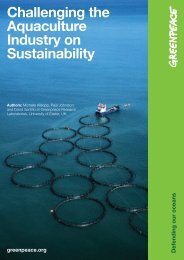Energising South African Cities & Towns - City Energy Support Unit
Energising South African Cities & Towns - City Energy Support Unit
Energising South African Cities & Towns - City Energy Support Unit
You also want an ePaper? Increase the reach of your titles
YUMPU automatically turns print PDFs into web optimized ePapers that Google loves.
QUESTIONS TO ASKWHILE GATHERING DATA1. Find out why the agency or group collects the information. This may uncover opportunities forfuture co-operation. For example, if they are planning a survey soon, will they include questionsthat could help your work?FINDING THEINFORMATIONThe questions below will help youdetermine where you can get theinformation you want.• Who pays for, or taxes, theresource? Following the moneyis always a good place to start.• Who manages or plans theresource? Think about the agencyor company that records, permits,inspects, controls, builds,repairs or delivers the resource.• Who else is interested in thisinformation? There may be othergroups that have collected someof the data you need. Goodplaces to start include relatedcity departments, environmentalgroups, universities, and thelocal chamber of commerce.• Use figures from an area largerthan your city to estimate thenumbers you want. Be explicitabout the assumptions inyour estimates.HOW MUCH DETAILDO YOU NEED?It pays to err on the side of havingtoo much information. As you gatherthe data, consider its accuracy.Find out how the data was generated.Examine the assumptions andmethodology. Do they make sense?On a single topic, such as housingor population, you may gatherdata from two different sources.Do the results agree, or are therediscrepancies?A deeper understanding of howthe data was generated can tell youa lot about its accuracy.2. Ask how the information is collected as clues to data’s reliability. Who collects the information?Do they use direct measurements or rely on reports or forms sent in by others? Do theydrive around and count? Do they take a sample and make a projection? How accurate dothey think the numbers are? How did they determine the accuracy? Compare differentsources where possible.3. Ask the group or agency if there have been changes in the methodology and if any are planned– changes in the methodology can skew your results and make it diffi cult to establish trends.Are you talking to someone who is actually involved or is this a second-hand interpretation?4. How far back has the agency been tracking the information? This is important to your abilityto establish a common base year for all your data.5. Ask who, if anyone, analyses the information. Do city staff members analyse the data? Do theysee any trends? If they calculate any projections ask if they use simple extrapolation or a morecomplex algorithm.6. Don’t be afraid to ask stupid questions. Ask lots of questions about the meaning of the numbers,the units and any assumptions behind them. Jumping to conclusions can be dangerousto your results.8. Get a copy of any published or draft reports. Keep a separate library of environmental auditand data support materials.PROBLEMS YOU MAY ENCOUNTER …BUT CAN OVERCOME IN TIME!• No data or inaccessible data• <strong>Energy</strong> supply info is good but demand (user) info is poor• No centralised collection of data on energy• Data not collected in the units you need• Data by region, not by city• Good data on one sector for one year, but for no other sectors for that year• Very basic information on facilities may be lacking• Different departments don’t communicate with each otherGATHER FACTSTHAT ENHANCECOMMUNIT YUNDERSTANDINGSimple facts make the project real to cityleaders and the community. How much doaverage households spend for home energy oron transport? How much air pollution is causedby local energy use? What health problems arecaused by local energy use? Gather some ofthis information and show the facts and fi guresin graphic form, such as a pie chart or graph.ENERGISING SOUTH AFRICAN CITIES & TOWNS 11


